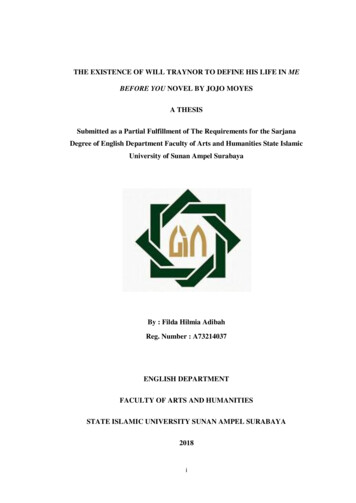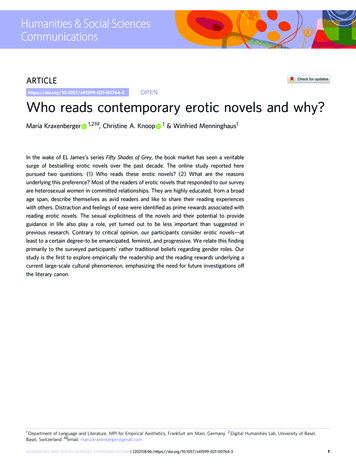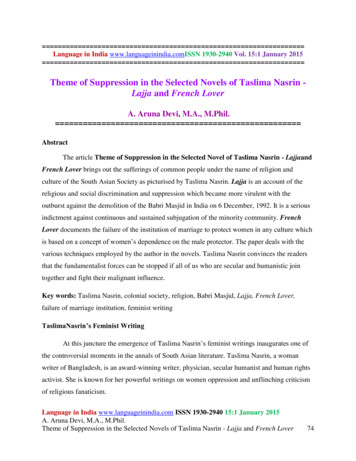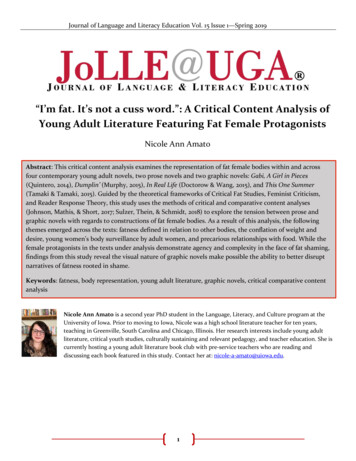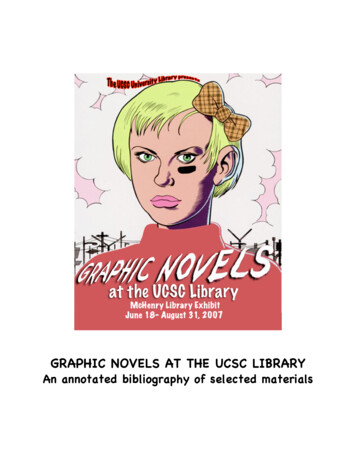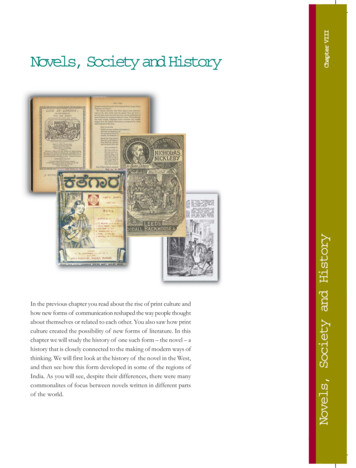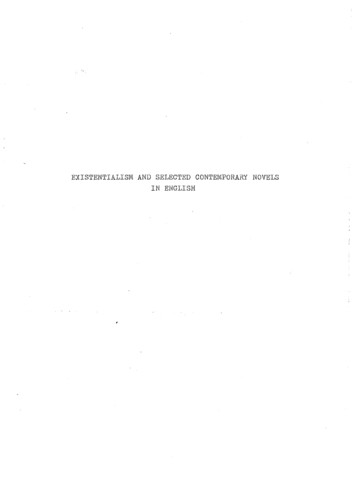
Transcription
EXISTENTIALISM AND SELECTED CONTEMPORARY NOVELSIN ENGLISH
EXIS'fENTIALISlVI AND SELECTED CONTEMPORARY NOVELSIN ENGLISHbyMICHAEL G. COLE B.A.A ThesisSubmitted to the School of Graduate Studiesin Partial Fulfillment of the Requirementsfor the DegreeMaster of ArtsMcMaster UniversityAugust 1975
MASTER OF ARTS (1975)(English)TITLE:McMASTER UNIVERSITYHamilton, OntarioExistentialism and selected contemporary Novelsin English.AUTHOR: Michael G. Cole B.A.SUHERVISOR: Dr A. Bishop.NUMBER OF PAGES: v t 94.ii
ABSTRACTAs "an attitude and outlook that emphasises humanexist nce"l, Existentialism can clearly be related to theconcerns of the novel as a genre. This thesis investigatesthat relationship, suggesting that the contemporary novelcontains ideas which are also expressed in existential thought;it also suggests that a knowledge of existential ideas is animportant tool for the critic of modern fiction. It has beensuggested that this similarity of thought may be explainedas "The whole mind of the times inclining in one direction. ,,2.Both Existentialism and the contemporary novel can be seen asmanifestations of the world viewed in a certain manner.Existentialism iis not considered to be separate from modernfiction; concern for the individual forms the essence of bothmovements.The contemporary novel offers many examplesof existential thought. This thesis could not, of course,hope to include all these examples. Certain novels have beenreferred to on several·occasions because they illustrate morethan one existential idea. lflY contention that Existentialismhelps towards an understanding of the contemporary novel is--------l H H mOtf us,Living Issues in .Philoso12h;:L (New York, 1964),p.296.2·w.Barrett, Irrational Man, (New York, 1962), p 4.iii
sUbstantiated by this approach. A majority of the novelscited appear on the graduate course which covers contemporary fiction. The following chapters were written withthis course in mind; the contemporary novel is linked in thismanner because I believe that Existentialism clarifies thethoughts expressed in the novels.The form which the thesis takes is abrief exposition of Existentialism followed by examples of thisthought in selected novels. Four of the following chaptersdeal with ideas in the contemporary novel and the first- chapteris a description of Existentialism. Rather than select a fewworks I have chosen to use many novels in the belief thatit exposes more clearly the main a rgument of this thesis. Thepresence of existential thought in so many novels is proof,Ibelieve. that a knowledge of Existentialism is necessaryfor the reader of the contemporary novel. The final sectionof the work concludes t,hat Existentialism and the contemp-orary novel should be considered together when the subjectis the individual in the present society.iv
TAB L EoFCON TEN T SPageCHAPTER ONE:CHAPTER TWO:CONCEPTS ARISING FROM EXISTENTIALTHOUGHT1SUBJECTIVITY IN THE CONTEMPORARYNOVEL17PERSISTENT STRIVING IN A MEAlUNGLESSUNIVERSE36CHAPTER FOUR:RELIGION IN THE CONTEMPORARY NOVEL53CHAPTER FIVE:TIME AND DEATR IN TIlE CONTEMPORARYNOVEL. 70CHAP'I'ER THREE:CONCLUSION85BIBLIOGRAPHY92v
CHAPTER ONECONCEPTS ARISING FROM EXISTENTIAL THOUGHTIt is quite clear that existential philosophersstress ideas which are common to all existenttal thinkers.What they have in comnon is more than the subjectivitystressed by Kierkegaard,1or the attempt to put philosophyback on the track of the individual rather than of theexternal world.The development of existential thoughtsince the early 19th century re-iterates certain themes,confirming the statement by William Barrett about thosereluctant to accept the philosophy of Existentialism:Philosophers who dismissed Existentialism as"merely mood" or "a postwar mood" betrayed acurious blindness to the concerns of the humanspirit, in taking the view that philosophictruth can be found only in those areas ofexperience in which human moods are notpresent.2Modern Existentialism is not.a post-war. phenomenonbut something which has been steadily growing sinceKierkegaard.The ideas found in contemporary existentialphilosophers were formulated, perhaps somewhatdifferent y,by those who first retaliated against impersonal science1J. H. Blackham, Reality, Man and Existence (NewYork, 1971), p. 22.2IN. Barrett ; Irrational pilan, p. 10.1
2in the 19th century.The ideas of Sartre, for example,share a common ground with those of Heidegger and Nietzsche.Kierkegaard's thoughts on subjectivity were reemphasised by each existential philosopher that followedhim.Although the subjective and the objective may takea different form,as in Buber's argument for the validityof human relationships, the subjective was re-vitalisedby Kierkegaard and took precedence over the objective.The subjective also formed the essence in Nietzsche'sconcept of the Superman as well as the personal Daseinof Hei.degger.Success in Nietzsche's world requiredarriving at the state of superman, and the state of superman was arrived at throughsubjective introspeG:;tion.The Will to Power, a subjective response to happenings in heexternal world, also depended on the subjective ratherthan the objective.Nietzsche's claim that "God is dead"threw existence back on to the subjectivity of the individual; from Nietzsche's point of view there were nolonger any props in the external world to support man, hemust be prepared to live in his own subjectivity.Heidegger states in Being' and Time thatis always "my own personal Dasein".DaseinBeing is thus tied tothe individual and cannot be shared, i.e. Dasein is subjective.Heidegger's whole analysis of Being presupposessubjectivity; the only being that we know is ouro T.being,
3not the being of anyone else or of objects.on "authentic"His emphasisbeing as opposed to l1inauthentic" beingstresses again the priority of the subjective.11Authentic"being' depends on the subjective response to l1being-in-theworld l1 :"authentic" or l1inauthentic"existence is judgedthrough the subjective response to what it experiences.Buber's belief that existential existence was precipitatedby the l1I-Thou" relationship also implies that it is thesubjective which differentiates between the "Thou l1 and thellItl1.The "I-Thou" relationship is a description of thesubjective state in its correct function.Although de-pendent upon the relationship with another person, therelationship itself is gauged through the response of thesubjective being.Sartre's negation of the self, and his idea that.there are two different types of being, relies once againon subjectivity.Like Heidegger, the kind of being isdetermined in relationship to what it means to the in-wheth,er the individual, is leading an existential life.Theidea of being "engage 'I, as well as Sartre' s concept of manbeingllcon demned to be free l1 , also depends on subjectivity.Engagement, for Sartre, is the right kind of existentialexistence, and like Heidegger ISupon the individual.11authen tic"being it dependsThe state of condemnation which Sartre
4posited for man relates directly to each persons own subjectivity.To be "condemned to be free" is, according toSartre, a manifestation of the subjective condition of eachindividual.It is the subjective base from which the "Willto Action" operates.Kierkegaard argued that the individual must be ina state of "persistent striving" in order to attainexistential being.The tension between the subjective andthe objective provided an environment in which the individual must constantly seek and re-seek subjective truth.The idea of repetition, in a temporal sense, lies at theheart of existentialism and provides it with the crucialdifference between it and speculative philosophy.Whateverthe reasons for existence, and they are clearly differentin the case of Kierkegaard and Sartre, it is not, asKierkegaard suggested, the "What" that matters.Whatmatters is "How" one, in Kierkegaard's case, pursues.Christiani ty; the "How" involves repetition which takes placein the face of a meaninglessu iverse.Nietzsche felt that God must be replaced in theworld by man.Nietzsche's superman is precisely that whichmay take his place.is not permanent:The state of the superman, however,it is a condition to which the individualmust continually "overcome ll One way of describing thecondition of the superman is as a transcendent state;the
5ordinary world of everyday events and objects may be leftbehind through the motivation ofthe Will to Power .This simplification of Nietzsche's superman does indicatethat it required something comparable to Kierkegaard's"persistent striving" in order to be attained.Nietzsche'sbelief in "the eternal return of the same" clearly suggeststhe repetition Kierkegaard saw in "persistent striving".It was, however, a source of disgust for Nietzsche, "Andthe eternal return also of the smallest man!that wasmy disgust at all existen el 3For many existential thinkers this repetition took place inthe face of meaninglessness.In fact,the idea of repetitionwas as important as the existential experience itself.The notion of "persistent striving" also plays anessential part in the philosophies of Heidegger, Buber andSartre.For Heidegger there was the continual attempt ofthe "inauthentic" being to become "authentic" as there wasfor Sartre's "en-soi" to become a "pour-soi".The fact that,according to Buber, the "I-Thou" relationship becomes an"I-It" relationship further suggests "persistent striving".The self must continually seek the "I-Thou" relationshipalthough it may be aware that this is only a temporarycondition.3The similarity here is with existential existenceF. W. Nietzsche, Thus Spake Zarathustra (New York,1964), p. 268.
6in the face of the void; from Buber's point of view the"I-Thou" relationship must be continually sought,after although it slips back into the "I-It" relationship, andthis gives no meaning to existential being."existential" suggests,As the termthe existential state is notstatic but moving; time presents existence with new possibilities on which it must act.Unlike a closed specula-tive system there is always possibility in the existential.Existentialism is commonly accused of presentinga meaningless and absurd view of the world.That is, out-side of the self's existence, except in the case of Sartre,there is no meaning to anything.In later existentialphilosophy, particularly that of Sartre, this has beenexpanded to present a completely nihilistic view of theUniverse.Even for the Self, in Sartre's world, there isno meaning at all.It is true that such concepts a 'meaning lessness" and" the absurd" were formed by the early existentialphilosophers;" meaninglessness" and 'the absurd'; however, playedan integral part in the early philosophies which attemptedto explicate existential being.It is not until thephilosophy of Sartre thatllmeaninglessness"is given toeverything: in later existential philosophy "meaningJ,.essne§s" and"the absurdllproject the awful prospect withwhich they are attributed.
7For Kierkegaard it was the absurd which providedthe possibility of faith. Thus, the absurd had meaningfor the pursuit of Christian existence. The absurd was described by Kierkegaard as, "Faith is the objective uncertainty due to the repulsion of the absurd held fast by thepassion of inwardness, which in this instance is intensifiedto the utmost degreeo,,4 The meaning of absurd in theconventional sense was not exactly what Kierkegaard intended, it was the name given to an important function ofexistential beingo The conventional sense of meaninglessnessis more apparent in the philosophies of Nietzsche andHeidegger. Both philosophers suggest that it is only inthe face of meaninglessness that existential being can beachievedoNietz.sche's Will to Power and Heidegger's "authentic"being constantly bring the individual into contact withmeaninglessness It is from this meaninglessness that theindiv-idual must continually return to seekand Ifauthenticllthe Will to Powerbeing. Again it can be argued that meaning-lessness plays an essential· part in existential existence;without a sense of meaninglessness there would be no Willto Power or "authentic" existence.4. H. J Blackham, \§ali tY., !Vianand Exist-eno!:., (New York, 1971) ,pe51.
8Buber's claim that the "I-Thou" relationship isdestined to become an "I-It" relationship gives a meaningless status to existential being, In terms of permanencethere can be no "I-Thou" relationship and the self mustalways return to the meaninglessness of the "I-It" relationship. In Buber's argument for the necessity of human relations!1ips, the concept of meaninglessness is not as evident asin other existential-philosophies. Buber felt that there wasa positive side in man which ran counter to the ideas ofmeaninglessness and the absurd. It is precisely this positiveside of the self which is negated by Sartre. The assertionthat the bei.ng of the self is completely meaningless suggestsall entirely nihilistic universe. In Sartre r s world thereis no meaning to anything; man's existence is meaningless.Even in this attempt to lead an existential existence manis "absurd. As William Barrett has put it has put it, "manis an alien in the universe, unjustified and unjustifiable.absurd in the simple sense that there is no Leibnitzianreason sUfficient'to explain why he or his universe exists. 1I5 Two similar ideas which appear in existential philosophy are those of lithe void" and lithe abyss". The voidand the abyss refer to a negation of meaning much like theidea of meaninglessness and the absurd. Kierkegaard, in5. W.Barrett, Irrational Man (New York. 1962), p.262.
9describing the essence of his idea of paradox, had alreadyimplied the notion of the abyss when he suggested that inexperiencing the paradox one is "out upon the deep, over70,000 fathoms of water".The idea that one was faced withuncertainty in the confrontation with existential experience was, as both Heidegger and Sartre suggested, anintegral part of the experience.The Void, according toNietzsche, was that to which theWill to Powerindividual.led theIt was from the void that the individual mustcontinually seek theWill to Power .In Sartre's negative philosophy the void and theabyss play important roles.Representative of meaning-lessness, they represent, for Sartre, important conditions.Meaninglessness, Sartre suggests, may be gained by the"free project" which the individual "launches out ofhis own nothingness".6What this means is that through acorrect existential existence the self, by being "engage",learns the true meaning of the universe, and hisThevoidand thea . byss elf.are the world in which man lives;it takes the correct kind of existence for him to :-cealisethis.In fact,the concept of the void becomes the allimportant factor in the philosophy ofSartre 6W. Barrett, Irrati.onal Man, p. 247.Where Kierke-
10gaard had used it in his ·existen tial "system") it was,for Sartre, the ultimate statement of his philosophy.One of the most devastating statements made in theformulation of existential thought was Nietzsche'sassertion "God is dead".Nietzsche's denial of the exis-tence of a Christian god, and the emphasis put by thisassertion on theargument.crucial to the existentialindividual,a eIt was not necessary, however, to make this claimin order to justify existential being.Kierkegaard hadargued for belief in Christianity; what Kierkegaardsuggested was that there was a different way in whichChristianity may be experienced.The fact that allexistential philosophers stressed the importance of theS'elf did not mean that Christianity wascompletely rejected.Only with Nietzsche, in early existential thought, was manentirely alone without a God in the Christian ense;--The philosophies of Heidegger and Buber do not dealspecifically with Christianity or the possibility ofreligious belief.There is no attempt to provide analternative system to Christianity or suggestion of howthe Christian life may be led.Although Heidegger and Buberadvocated the predominance of the self, this did not denythat they were religious men.Indeed, Buber's "I-Thoul!relationship echoes the Christian dictum of "love thyneighbour." The ilI-Thou il relationship comes into being
11through the essentially Christian concept of love.Thereligious experience, according to Buber, was to be foundInin the "I-Thou" relationship, and not anything exteriorto man:Men do not find God if they stay in the world.They do not find Him if they leave the world.He who goes out with his whole being to meethis Thou and carries to it all being that is 7in the world, finds him who cannot be sought.The atheistic statement of Nietzsche was reflectedin the philosophy of Sartre.Sartre than heGod existed no more fordid for Nietzsche.Sartre' s concern isexclusively with what it means to be a human being.WilliamBarrett has pointed out Sartre's affinity with the earlierFrench philosopher Descartes.He shows the differencebetween the two philosophers in the following manner:The next step after the certitude of the Cogito,the "I Think", thus turns out to be a proof ofthe existence of God; and with God as guaranteethe whole word of nature, the multitude of thingswith their fixed nature or essences that the mindmay now know, is re-established around Descartes.Sartre, however, is the Cartesian doubter at adifferent place and time:God is dead, and nolonger guarantees to this passionate and principledatheist that vast structure of essences, the world,to which his freedom must give assent.87H . J. Blackham, Reality, Man and Existence, p. 218.8W. Barrett, Irrational Man, p. 243.
12with the increasing emphasis on the self in existentialphilosophy the possibility of there being an externalGod is remote. It was only bertain philosophers,hQwever,who explicitly denied the existence of a Christian God.Neither Heidegger or Buber were concerned with destroyingthe Christianity which had existed in Europe for manycenturies.In his analysis of Dasein, Heidegger introducesan unconventional view of time. This definition of time isalso qne of the major changes brought about by existentialphilosophy. Time was not considered by Heidegger in theway that it had previously been analysed. For Heidegger 3 timeincluded the past, present and the future. The temporalityof Dasein was not merely concerned with the present. now butrather with the existence of Dasein in the past, presentand future. As one critic has pointed out, "it may be saidthat all the dominant characteristics of Dasein gain theirfuller significance in the interpretation of its temporalityo,,9 This concept of time was adopted by Heidegger becauseit allowed for the necessary possibility of Dasein in thefuture; the conventional sense of time, which defined time9H.J.Blackham, Reality, an and Existence. ( ew York,1971),p.244.
13as a series of events in the present, did not accommodatethe future which was essential to human being.For Kierkegaard time was inextricably connectedwith heabsurd.In one sense Kierkegaard was alsochallenging the conventional sense of time.The assertionthat 1tthe eternal truth has come into being in time 1t , thusprecipitating the absurd, suggests that conventional time,i.e. the now, is not adequate.For Kierkegaard, asother existential philosophers, the future wasfor the possibilities in existential being.fornecessaryThe conventionalview of Time allowed only for the now, it did not providefor possibility.The root of Nietzsche's philosophy was founded inhuman fear.fear.The 1tWill to Power" is activated by humanThis suggests that value is something which theindividual must frequently experience, if he does not already live in a state of fear.Reidegger suggested much thesame thing when lie asserted that 1tBeing-in-the-World 1t wasa source of dread for the individual.Both f ear and dreadwere ideas presented by Nietzsche and Heidegger in order todescribethe immediacy in the existential experience.Itwas also suggested by Buber's 1tsuffering1t in the "I-Thou 1trelationship and Sartre's concept of "anxiety1t.Unlikespeculative philosophy, Existentialism was both passiveand active.The active element was attributed to an
14experience that made Existentialism immediate.The concepts ariSing from existential thought, andwhich contribute significantly to the contemporary novel,may be categorised in the following manner:(a)(b)(c)Cd}(e)(f)SubjectivityPersistent StrivingMea:n.inglessness and the AbsurdTh Death of GodTimeFear and Dread.My contention is that the modern novel is permeated byexistential thought.Hemingway once said that a writershould write "when he has something to say, not before,and not too damn much after".What contemporary novelistshave to say, I want to suggest, is a response to the agethat they live in.Not a social comment or observationas in previous centuries, but rather an outcry against thedehumanisation taking place in the 20th century.not surprising therefore that the thoughts ofIt isex stentialphilosophers should appear in contemporary fiction.Existentialism is a philosophy that deals precisely withthe impersonal world that technology has produced.Indeed,the formation of existential thoughtby Kierkegaard in the19th century was precipitated by the decline of religionunder scientific advance.This thesis does not suggest that the contemporarynovel lacks any reference to tradition.There are clearlymany contemporary novels which rely heavily on traditional
15structure and traditional themes.On the other hand thereare contemporary novels which do not adhere to any traditionat all.That is, some modern novels defy interpretationin the conventional sense.My belief is that these novelsillustrate existential thought at the expense of tradition;what the novels are primarily concerned with is an. -.exposition of existential ideas and not the production ofa novel which may be analysed in aconventionalwayWhat one is reading,in fact ,is an expression of existentialthought rather than a work of literature.The distinctionbetween literature as a form of existential "engagement",to use Sartre's terminology, and existential ideas inliterature, is drawn once a.gain.Whether in a traditionalstructure or not, the contemporary novel does contain manythoughts and ideas expounded by existential philosophers.The attempt will be made then to see to what extentthe concepts mentioned above are evident in contemporaryfiction.The difference between those novels which referto tradition and those which seem to be exclusively representative of existential thought will, of course, be noted.One point which must be made is that novels which dealprimarilywith existential thought rather than literaryachievement are very different from novels that precededthem .What I am suggesting here is that a new type of novel
16has appeared in contemporary fiction and one for whichan explanation needs to be given.
CHAPTER TWOSUBJECTIVITY IN THE CONTEMPORARY NOVELIn his book The Structure of the Novel, Edwin Muirdraws the distinction between the "character" novel and the"dramatic" novel.The essential difference is that the"dramatic" novel moves in time, whereas the "character"novelmoves in space.In the "character" novel, Muirsuggests, "The characters are changeless, and the scenechanging"; in the "dramatic" novel, "The scene is changelessand the characters change byanother". 1th irinteraction on neIn the attempt to illustrate subjectivityin the modern novel this distinction cleariy applies.Novels that deal with subjectivity fall into Muir's categoryof the "dramatic" novel; subjectivity is concerned with theresponse of a character, i.e. how the external world isseen through the eyes of an individual person and not astatic individual.Muir further suggests:These two types of the novel are neither opposites,then, nor in any important sense complements ofeach other; they are rather two distinct modes ofseeing life; in TIME, personally, and in SPACE,socially.2IE. Muir, The Structure of the Novel (London, 1960),p. 60.2 Ibid ., p. 63.17
18and:to say that a plot is spatial does not deny atemporal movement to it, any more, indeed, thanto say that a plot is temporal means that it hasno setting in space. Here again it is all aquestion of the predominating element.3Complying with his earlier analogy Muir suggests that the"dramati c " starts on the periphery and works toward thecentre.'Conversely the. "character" novel works from thecentre to the outside.The "dramatic" novel is obliviousof the outside as it proceeds towards the centre, notalong or over a series of spatially separated events, but ina temporal train, i.e. action.The action is dominatedby the characters and the .temporal progression of theirminds provides the denouement.It is upon the temporalaction of their thought processes. then that the whole plotor imaginative process of the novel is enacted.In his definition of the "dramatic" novel Muir usesthe conventional sense of t,·ime.Some contemporary fiction,however, does not subscribe to the conventional sense oftime.I shall discuss later in the thesis Muir's opinionthat the novel is either "predominan tly" character ormatic; it depends on the way in which time is used.Alexand iadra-Durrell'sQuartet seems to cancel the idea of predominance.That is, the characters seem to be as important as the. Op.cit., p. 64.
19action. In spite of this difficulty with time, Muir'sdistinction is a vali.d one. Subjectivity in the contemporarynovel may often be shown where there is a strong emphasison action, when the novel may be classified as "dramatic"rather than "character"" Paradoxi.cally the character ofthe protagonist is revealed more in the "dramatic H novelthan the novel. of "character". The "inner man", to useKarl's terminologyl, may best be shown in contemporaryfiction through the novels of action. The subjectivity resides in the responsive action of the protagonist to theevents and happenings which take place in the external world."The world for which Existentialism seeks toprovide an alternative is presented early in Norman Mailer'sythX Are JV InVi ?The world in which· Rusty seeks hisidentity is really an existential one:Go go, Dr Jek tell the folk, we're here to rock,the world is going shazam, hahray, harout, fartin my toot, air we breathe is the prez, presentdent. and God has always wanted more from man thanman has wished to give him. Zig a zig a zig.That is why we live in dread of God e (p.7)Mailer combines the tradition of the american hunt witha contemporary statement about the world of the present.Contrasted with the solidity of the"americart'tradition isthe state of the individual, "The fact of the matter is thatyou're u.p tight with a mysteryg me, and this mystery can'tbe solved because I'm the centre of it and I don't comP"1f} ,t;dI'Karl p. 'rh.e contemporary English Novel. (New Yorlt,1972).p.56.ll
20The conflict in the novel is between the world of Rustyand the world of his father.Rusty can find no points ofreference in his father's world.What herevealsis that it is impossible to try and accommodate anexistential existence in a traditional setting.This isprecisely why there is a Viet Nam for Rusty to go to afterthe disappointing relationship with his father.The worldis going "shazam" because it fails to recognise the "prez";it continues to construct things outside the individual.Why Are We In Vietnam?language.The incompatibility of Rusty's world with thatof his father is expressedlanguage.makes a particular use ofin obscenity and crudity ofThe protestation. against tradition is not con-ducted quietly.Margaret Atwood suggests in Sur'fac'i'ngthat IlLanguage divides us into fragments l i (p. 146), andit is precisely a fragmentary world that Rusty experiences.There is no IDlity and no wholeness.Rusty's subjectivityis occupied with events out of.which he cannot make any sense orunderstanding out of his father's world.The essentialdifference is between the existential way in which Rustylooks at the world, together with his subjective response,and the traditional ways of his father.By way of contrast John Williams' novel Stoner isa quietmanifest tionof subjective inability.Stoner'stedious existence is the result of his looking at the world
21from the standpoint of tradition rather than an existentialmanner.Stoner is unable to exist in the present and, ashis name implies, he is a methodical plodder.The novelshows the subjective response of Stoner to the events whichtake place in his life, and when he is confronted byArcher Sloane's statement that "Mr Shakespeare speaks toyou across three hundred yearsto respond." (p. 9) he is unableWhat has the potential of an existentialexperience for Stoner is not realised because of his subjective response.The reason that he chose English ratherthan Agriculture remains a mystery for Stoner; he knowsthat he has responded to a particular poem but he does notknow why.The inability to recognise iswhat makes.Stoner appear a tedious figure.Muir's distinction between the II dramatic "and the1/character " novel is exemplified in· Stoner and Why Are We InViet Nam?Rusty's search in the action of Mailer's novelis for his own identity in q world that does not make senseto him.Stoner passes through a series of events whichdo not make him any different at the end of the novel thanat the beginning.What Rusty learns through a painfulinitiation is that his father's world is not his world.Stoner's failing is that he does not learn or develop throughexperience.In one case the subjectivity of the individualresponds to the external world, and in the other it does
22not.The novels of William Golding are essentially concerned with the subjectivity of the individual.One critichas suggested that:He is not simply a social novelist attempting tosee man's response to a given society, but ametaphysical writer interested in states of beingand aspects of survi vq.l . In a l?road sense, hiswork is existential, an
TITLE: Existentialism and selected contemporary Novels in English. AUTHOR: Michael G. Cole B.A. SUHERVISOR: Dr A. Bishop. NUMBER OF PAGES: v t 94. ii . ABSTRACT As "an attitude and outlook that emphasises human exist nce"l, Existentialism can clearly be related to the concerns of the novel as a genre. This thesis investigates that relationship, suggesting that the contemporary novel contains .
